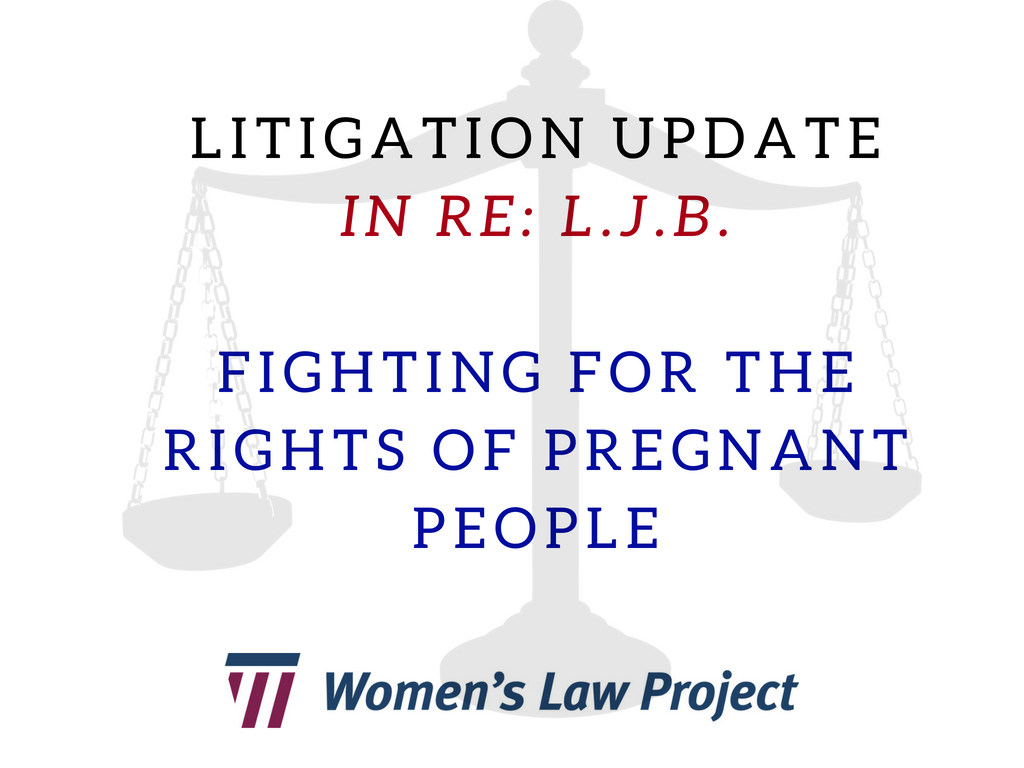We just filed our main brief in an important case that may have a profound influence on public health and the rights of pregnant people in Pennsylvania and beyond.
Can a woman’s behavior while pregnant be considered child abuse under civil law?
That’s the fundamental question in In re: L.J.B., a case co-counseled by attorney David S. Cohen, Professor of Law at the Thomas R. Kline School of Law at Drexel University and member of the WLP Board of Directors and WLP Executive Director Carol E. Tracy, along with Robert Lugg of Lugg & Lugg in Lock Haven.
You can read and download all case documents here.
Background
Last year, the U.S. Department of Health and Human Services declared opioid addiction a public health emergency. Millions of Americans are struggling with opioid addiction, and many of these people are women of childbearing age.
Like many people suffering from addiction, a pregnant Pennsylvania woman did not completely refrain from using opioids while in treatment for her addiction.
She gave birth to L.J.B. When L.J.B. was born, initial testing indicated that she was healthy. However, according to hospital records, she began to show signs of what the physician labeled “opioid withdrawal,” and L.J.B. was admitted to the hospital. She remained there for 19 days. There is no indication in the record of any further health problems for L.J.B.
Based solely on the mother’s positive drug test and L.J.B.’s hospitalization for alleged withdrawal symptoms, Appellee Clinton County Children and Youth Services (CYS) claimed that L.J.B. is a victim of child abuse.
Nothing about the mother’s behavior subsequent to L.J.B.’s birth is part of the alleged basis for a child abuse finding. However, the court concluded that it was her drug use during pregnancy that caused or created a reasonable likelihood of causing bodily injury after birth and could be the basis of a finding of child abuse under the statute.
Case Update
In January, the Women’s Law Project, along with Lugg, asked the state Supreme Court to review a decision from the Superior Court that held that a woman can be charged with civil child abuse for using drugs when pregnant.
On April 3, the Supreme Court granted allocatur to review the Superior Court’s determination, overruling the trial court.
On May 3, WLP submitted its main brief to the Supreme Court. Four different amicus briefs supporting WLP’s position have also been filed. Amici are child welfare advocate-experts including the Support Center for Child Advocates and Juvenile Law Center; public health and maternal welfare experts including National Advocates for Pregnant Women and Community Legal Services; drug policy experts including the Drug Policy Alliance and Families for Sensible Drug Policies; and constitutional law experts including the Feminist Majority Foundation and the ACLU of Pennsylvania.
What’s at Stake?
In re: L.J.B. may have profound implications for public health. Every major private and public health organization recognizes that punishing pregnant women for prenatal drug use is counterproductive to public health goals.
“This misguided ruling could not have come at a more dangerous time,” says attorney David S. Cohen. “Our country is in the middle of an opioid epidemic. Public health experts are calling for more paths to recovery, not punishing pregnant women who seek treatment. Beyond exacerbating the public health crisis of opioid addiction, this attempt to label this woman a child abuser based on her actions while pregnant is wholly inconsistent with the purposes of the law in question.”
It also represents a slippery slope.
“Punishing pregnant women for drug use during pregnancy could open the door to punishing pregnant women for all sorts of other behaviors, including things like eating cold cuts, soft cheese, and sushi,” says WLP Executive Director Carol E. Tracy. “Drinking wine and coffee, taking prescription medicine, traveling to countries that potentially have Zika, being treated for cancer, traveling by plane late in the pregnancy, and being assaulted by an abusive partner, too.”
Indeed, the door could open to punishing all women of childbearing age for actions taken before getting pregnant.
Stay tuned for updates.
The Women’s Law Project is a public interest law center in Pennsylvania devoted to advancing the rights of women and girls.
Sign up for WLP’s Action Alerts here. Follow us on twitter and like us on Facebook.
We are a non-profit organization. Please consider supporting equal rights for women and girls by making a one-time donation or scheduling a monthly contribution.



